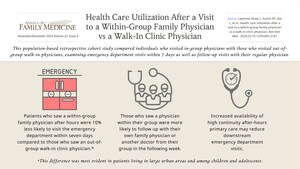Annals of Family Medicine: Researchers develop online guide to help family medicine doctors discuss vaccine hesitancy with patients
ANN ARBOR, Mich., April 25, 2022 /PRNewswire/ -- A team of public health specialists from the University of Calgary School of Public Policy has developed an interactive, web-based guide to help family doctors better speak to a wide range of patient concerns related to the COVID-19 vaccine.
The researchers – which include Myles Leslie, PhD, Nicole Pinto, MSc, and Raad Fadaak, PhD – document the process their team used to create and disseminate a conversation guide for health care providers in a new publication now available in Annals of Family Medicine. The paper, titled, "Improving Conversations with COVID-19 Vaccine Hesitant Patients: Action Research to Support Family Physicians" can be found on AnnFamMed.org here: https://www.annfammed.org/content/early/2022/04/22/afm.2816
The online guide was created for and with family medicine practitioners, who often serve as the first point of contact for patients seeking COVID-19 treatment or have questions about how to protect themselves and their loved ones. To ensure the guide was relevant to health care providers, Leslie et al conducted qualitative interviews with primary care doctors in multiple Canadian provinces. The data gathered through these interviews was then used to identify commonly held beliefs, attitudes and perceptions that impact a patient's willingness to receive the vaccine. "This attention to clinical experience was central to achieving buy-in from our participants," the team wrote.
The research team found that clinicians were frequently encountering many of the same reasons for hesitancy from their patients including concerns around safety; interactions with comorbidities; conspiracy theories; religious or moral obligations; and past traumas experienced in the medical setting.
Using this information, researchers created several provider resources to better counsel vaccine-hesitant patients, in direct response to each potential concern. These are free to the public and include tips for clinicians, patient-provider conversation scripts, and resources to help navigate conversations about COVID-19 vaccines with hesitant patients.
The guide also outlines four steps to help practitioners have better conversations with vaccine hesitant patients, emphasizing the physician's role as an ally on the patient's health journey. Steps include engaging with patients; affirming patient concerns; asking permission before sharing information; and evoking future risks to motivate patients to reconsider vaccine hesitancy.
The guide is available at www.vhguide.ca.
Myles Leslie, Nicole Pinto and Raad Fadaak
SOURCE Annals of Family Medicine

WANT YOUR COMPANY'S NEWS FEATURED ON PRNEWSWIRE.COM?
Newsrooms &
Influencers
Digital Media
Outlets
Journalists
Opted In






Share this article